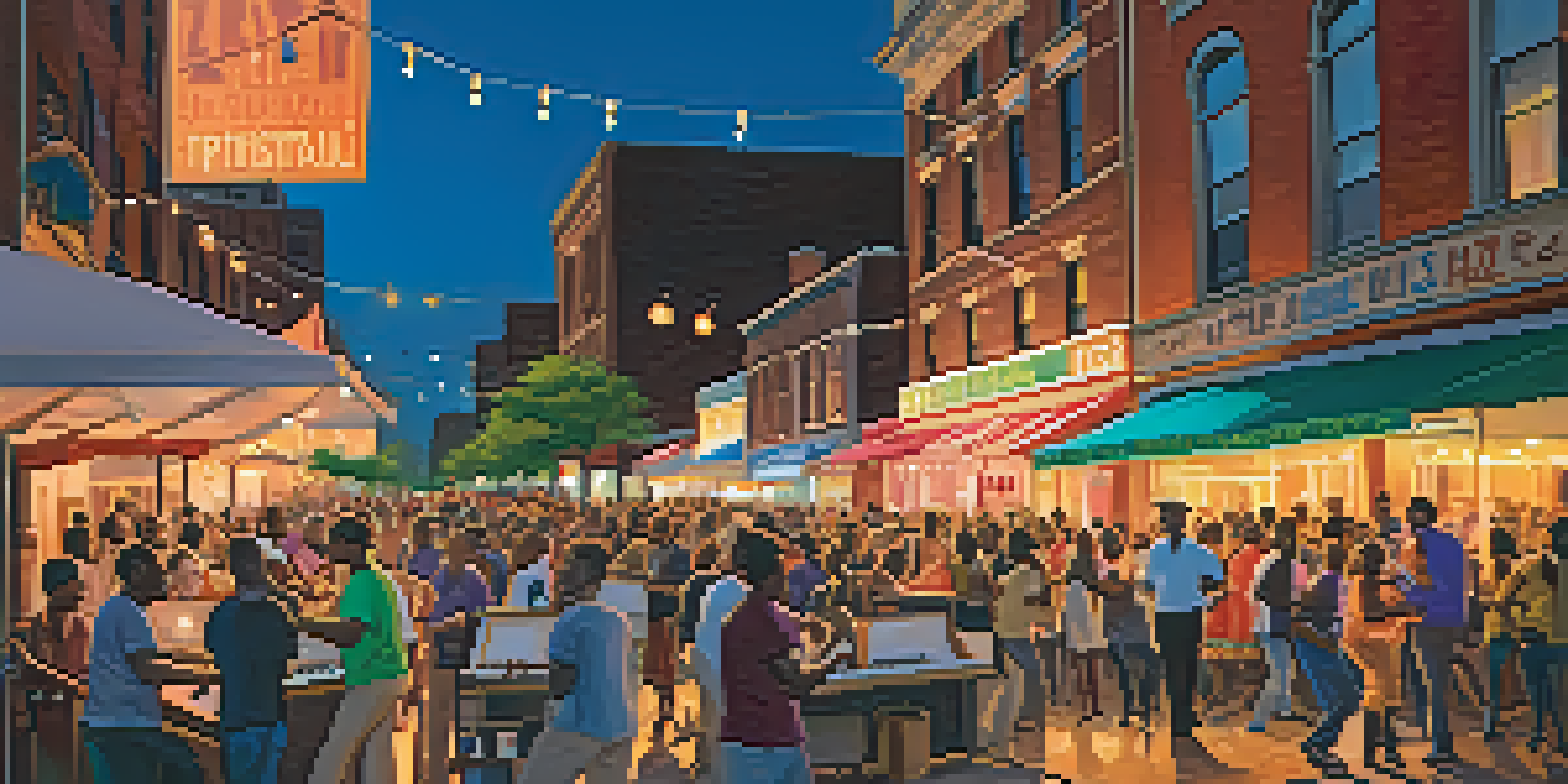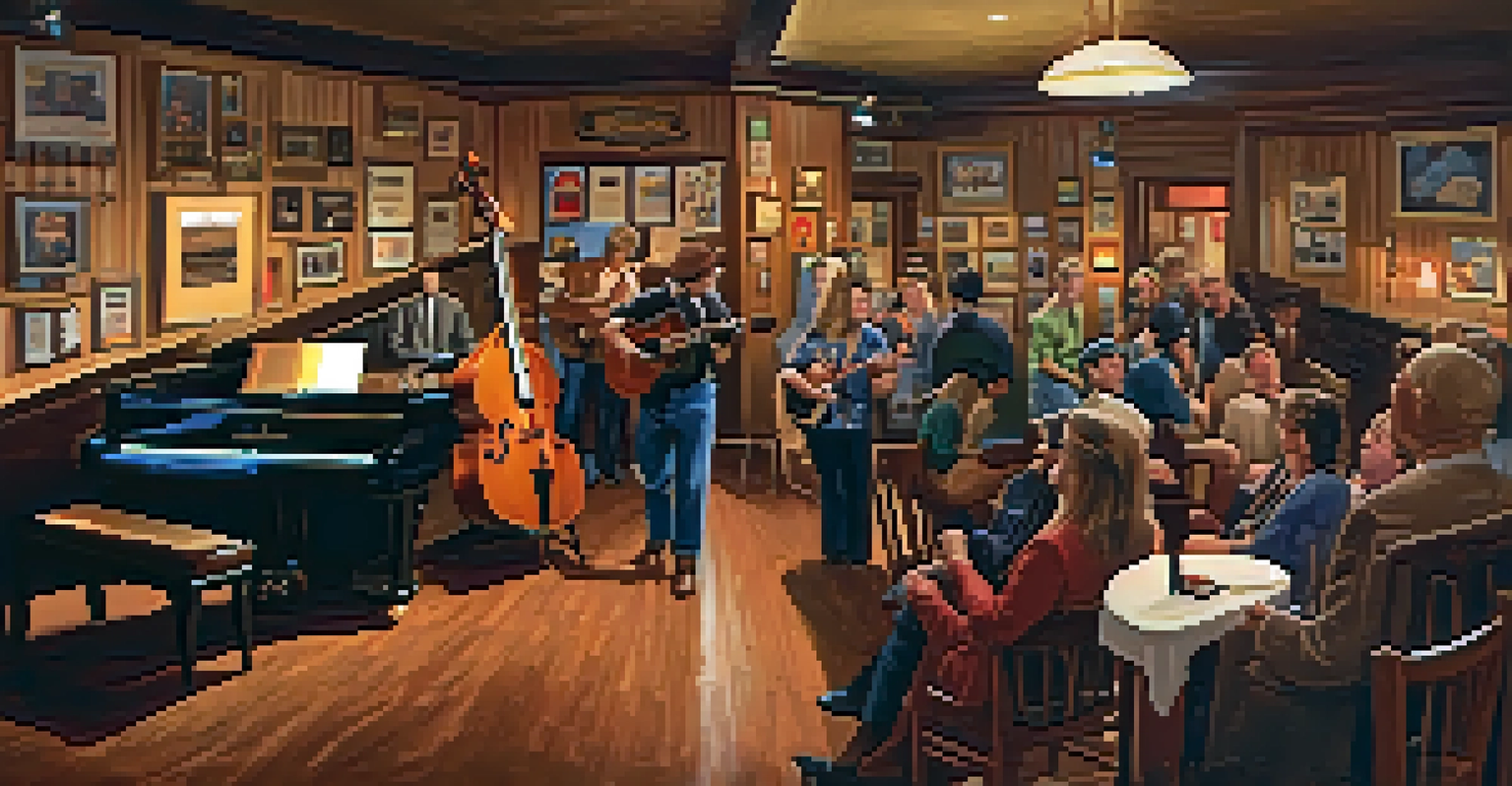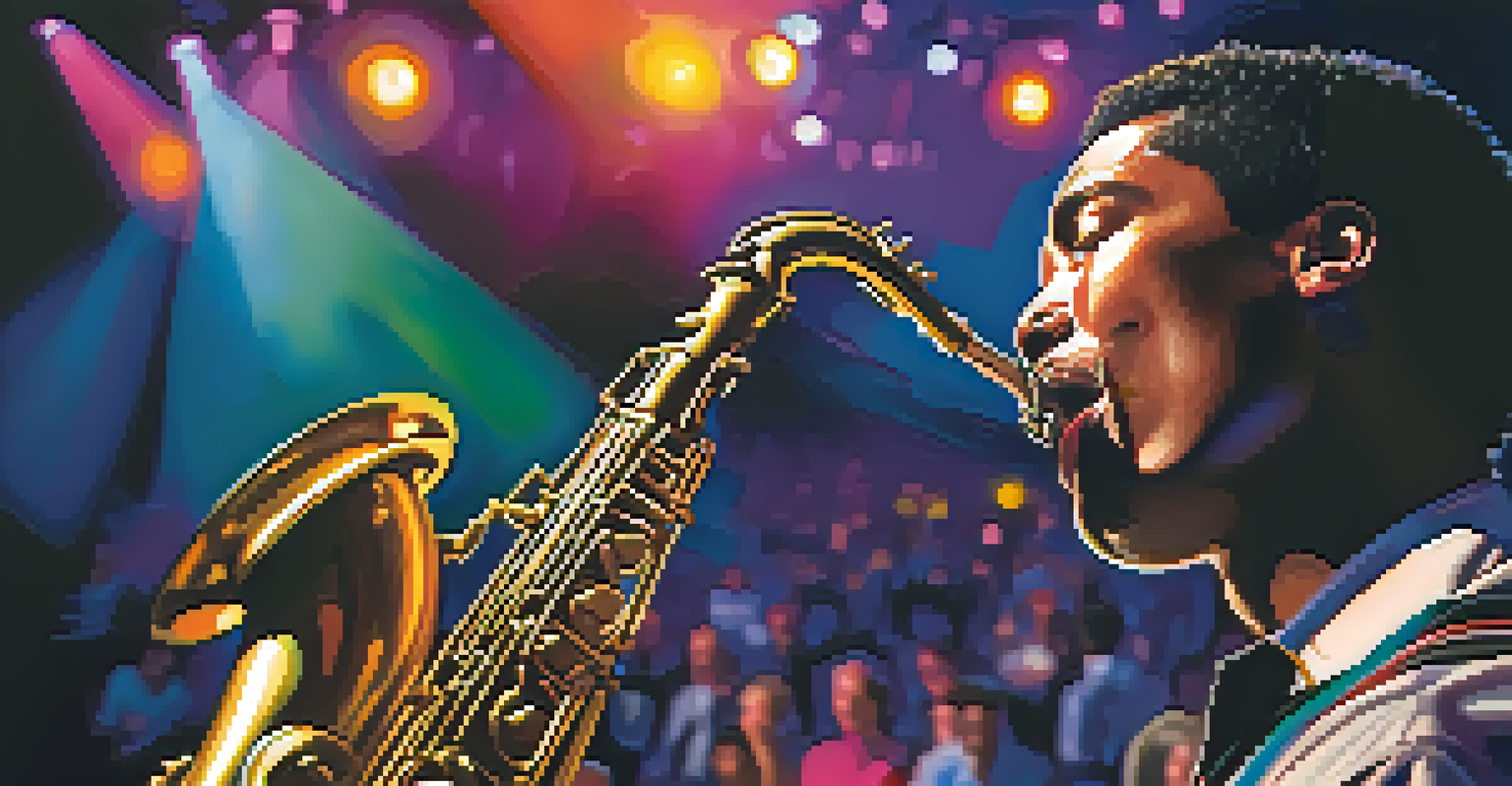Jazz and Blues in St. Louis: The Heart of Music Culture

The Historical Roots of Jazz and Blues in St. Louis
St. Louis has long been a pivotal point in the development of jazz and blues music. The city’s unique geographical location made it a melting pot of cultures, allowing diverse musical styles to flourish. In the early 20th century, the Great Migration brought a wave of African American musicians to St. Louis, infusing the local scene with new energy and creativity.
Jazz is not just music, it’s a way of life.
The iconic blues artist, W.C. Handy, even performed in St. Louis, inspiring countless musicians. This blend of influences set the stage for legendary venues and events that would shape the music landscape. As jazz and blues evolved, St. Louis emerged as a key player in the narrative of American music.
Today, the echoes of this historical foundation can be heard in the rhythms and melodies that fill the city's clubs and streets. The rich legacy continues to inspire new generations of artists, making St. Louis a living testament to the enduring power of these genres.
Iconic Venues That Shaped St. Louis Music
When you think of St. Louis, legendary music venues like the Blueberry Hill Duck Room and The Pageant come to mind. These spaces have hosted countless artists, from local legends to international stars, creating an intimate connection between performers and audiences. Each venue has its own unique vibe, contributing to the city’s eclectic music scene.

Blueberry Hill, for instance, is not just a restaurant; it's a shrine to music history, showcasing memorabilia from some of the greatest musicians. This connection to the past enriches the experience, making every performance feel like a continuation of a storied tradition. The Pageant, on the other hand, offers a larger platform, where the energy of a crowd can amplify the magic of live performance.
St. Louis: A Jazz and Blues Hub
St. Louis has been a crucial center for jazz and blues, shaped by a rich history and diverse musical influences.
These venues serve as cultural hubs, attracting music lovers from all walks of life. They embody the spirit of St. Louis music, where every note tells a story and every performance is a celebration of creativity.
Modern Jazz and Blues Festivals in St. Louis
St. Louis is home to several vibrant festivals that celebrate its jazz and blues heritage. Events like the St. Louis Blues Festival and the Greater St. Louis Jazz Festival draw crowds eager to experience live music from both established and emerging artists. These festivals not only highlight the city's rich musical culture but also foster community and connection among attendees.
Blues is a tonic for whatever ails you.
During these festivals, the streets come alive with the sounds of soulful blues and lively jazz, creating an atmosphere that’s both festive and communal. Festival-goers can dance to the rhythm, sample local food vendors, and engage with artists at various booths. It's a perfect way to immerse oneself in the culture and history of St. Louis music.
Moreover, these festivals play a crucial role in supporting local musicians. They provide a platform for artists to showcase their talent, ensuring that the legacy of jazz and blues continues to thrive in the city.
The Influence of St. Louis Musicians on Jazz and Blues
St. Louis has produced a remarkable array of musicians who have made significant contributions to jazz and blues. Legends like Miles Davis and Chuck Berry paved the way for future generations, blending their unique styles with the rich traditions of the city. Their music not only resonates locally but has also influenced artists worldwide.
Miles Davis, often hailed as a pioneer of modern jazz, started his journey in St. Louis, where his early experiences shaped his innovative sound. Similarly, Chuck Berry's rock and roll roots are deeply embedded in the blues tradition of the city, showcasing how interconnected these genres are. These artists’ legacies are a testament to the city's profound impact on the broader music landscape.
Iconic Venues Fuel Music Culture
Legendary venues like Blueberry Hill and The Pageant play a vital role in connecting artists and audiences, enriching the city's music scene.
Today, emerging musicians in St. Louis continue to draw inspiration from these icons, creating new sounds that pay homage to their predecessors. This ongoing cycle of influence ensures that the spirit of jazz and blues remains vibrant and relevant.
Learning About Jazz and Blues Through Local Education
Education plays a vital role in preserving the legacy of jazz and blues in St. Louis. Institutions like the University of Missouri-St. Louis offer programs dedicated to music education, focusing on the history and techniques of these genres. This academic approach not only cultivates talent but also deepens students’ understanding of the cultural significance of their craft.
Workshops, masterclasses, and performances by visiting artists provide invaluable experiences for aspiring musicians. These initiatives create opportunities for students to collaborate and learn from seasoned professionals, fostering a sense of community within the local music scene. As a result, St. Louis continues to nurture the next generation of jazz and blues artists.
Furthermore, community organizations often host events that promote music education, ensuring that the rich traditions of jazz and blues are passed down. This commitment to education underscores the city’s dedication to preserving its musical heritage for future audiences to enjoy.
The Role of Local Radio Stations in Music Culture
Local radio stations in St. Louis play a crucial role in promoting jazz and blues music, serving as a lifeline for these genres. Stations like KDHX offer dedicated programming that highlights both local artists and classic tracks, creating a platform for discovery and appreciation. This exposure helps keep the music alive and relevant in today’s fast-paced digital world.
Listeners can tune in to hear everything from traditional blues to contemporary jazz, often featuring interviews with artists and live performances. This connection fosters a sense of community, bringing together fans and musicians alike. It's not just about the music; it's about sharing stories and experiences that resonate with the audience.
Festivals Celebrate Musical Heritage
Modern jazz and blues festivals in St. Louis foster community and support local musicians, ensuring the genres' legacies continue to thrive.
Moreover, local radio stations often collaborate with music festivals and events, further embedding themselves in the fabric of St. Louis's music culture. By championing local talent and providing a space for diverse voices, these stations ensure that the sounds of St. Louis continue to thrive.
The Future of Jazz and Blues in St. Louis
As we look to the future, the legacy of jazz and blues in St. Louis remains strong and vibrant. New venues are emerging, and innovative artists are continually pushing the boundaries of these genres. This evolution reflects the city’s ability to adapt while honoring its musical roots, ensuring that both jazz and blues remain relevant.
Collaborations between artists from various genres also signal a bright future for St. Louis music. By blending styles and experimenting with new sounds, musicians are creating fresh interpretations of jazz and blues that appeal to younger audiences. This cross-pollination of influences keeps the music dynamic and engaging.

Ultimately, the commitment of the community—from musicians and educators to fans—will shape the future of jazz and blues in St. Louis. With a rich history to draw from and a passionate audience to support them, the city is poised to remain at the heart of music culture for years to come.